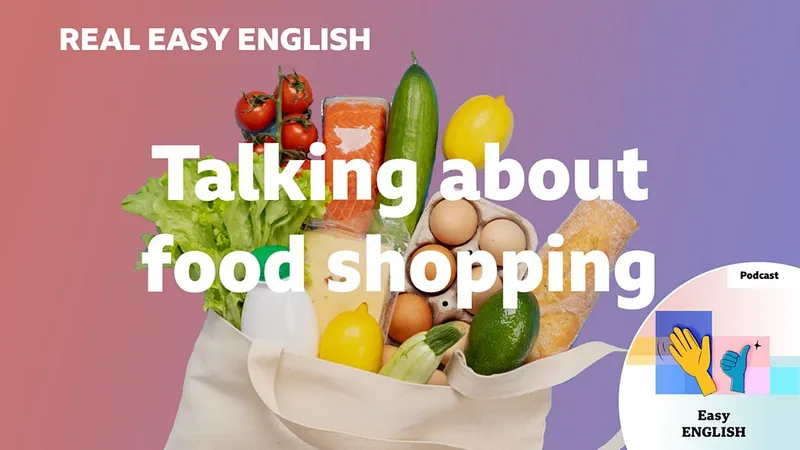Beth Hello and welcome to Real Easy English, the podcast where we have real conversations in easy English to help you learn. I’m Beth.
Neil And I’m Neil. You can read along with this podcast and find a worksheet to help you learn on our website: bbclearningenglish.com.
Beth Neil, how are you?
Neil I’m really well, Beth. How are you?
Beth I’m alright, thank you. Today we’re talking about food shopping and we’ll talk about the kinds of foods that we buy.
Neil OK, let’s get started. So, Beth, how often do you go food shopping?
Beth Oh, quite often. I think I go maybe two or three times a week. I prefer to get smaller shops because then you get fresher ingredients rather than doing one big food shop. And it also gets me out of the house.
Neil Right.
Beth What about you?
Neil I would like to go shopping once a week, but there isn’t enough room in my fridge for all the food that I need for a week, and I’m not organised enough. So I go often. Every day, every other day maybe.
Beth OK, so Neil, what sorts of foods do you buy every week generally?
Neil Well, I buy staples. Things like pasta, rice, bread, potatoes, the basic parts of a meal that fill you up. And I usually think about what meals we want to have and then get the ingredients for those.
Beth Yeah, I’m the same. I would say we normally buy a bag of pasta. And we normally have a loaf of bread once a week. But then if I buy something like cereal, we don’t have that too often, so I might get a box of cereal maybe once a month. And that lasts us for the whole month.
Neil I get a jar of marmalade every week.
Beth What?
Neil Because I love marmalade so much, and I’m the only person who eats it in my house.
Beth You must have so much marmalade on your toast to go through one a week. That’s crazy.
Neil I love it.
Beth OK. So, we’ve talked about bread. We both like a loaf of bread when we go shopping. But the grammar of that is quite interesting, isn’t it?
Neil Yes. So, when we have a noun like bread or rice or jam, which is uncountable, you can’t count it, we need something to describe what it’s in. So we have a loaf of bread, and that makes it countable. A loaf. A jar of honey or jam. A bag of pasta.
Beth Yeah, exactly. We can’t say pastas or breads or rices. It just sounds really weird. So you’d need to say, oh, please remember to buy a loaf of bread. Or you could say, please buy some bread.
Neil Yeah. Now, some nouns are countable and uncountable. For example, if you say, I’m going to buy some chicken and I’m going to buy a chicken, what’s the difference?
Beth So, if you buy some chicken, it means parts of chicken, like maybe chicken legs or chicken breasts. Whereas if you say a chicken, it means a whole chicken.
Neil A dead one.
Some food, though, is simpler grammatically. So, for example, you can count an apple or a banana. So you can say ‘apples’, ‘bananas’. Just a normal plural.
Beth Exactly. Yeah, I could buy an apple, or I could buy five apples. And that is very simple. Whereas something like tuna, you can’t buy tunas. It has to be a tin of tuna.
Neil Beth, when you go shopping, do you make a list?
Beth No, I kind of have a list in my head, but then I go a bit crazy when I get there. You should never go shopping when you’re hungry.
Neil That’s true.
Beth What about you?
Neil I always take a list. And even when I have a list, sometimes I forget things.
Beth Oh dear.
Neil And also, sometimes I can’t read the words on the list that I’ve written.
Beth Let’s recap the vocabulary we heard during the conversation. We had shopping list, all the food you need to buy written down so you remember it.
Neil And we talked about lots of foods we buy, which are uncountable nouns. So, when we buy these, we have some useful ways to talk about them. For example, we buy a loaf of bread.
Beth A bag of pasta.
Neil A jar of honey, or my favourite marmalade.
Beth And some chicken. But you can also buy a chicken. That’s a whole chicken. Then it would be a countable noun. Just like ‘apples’ and ‘bananas’.
Neil That’s it for this episode of Real Easy English. To test what you’ve learned, try the worksheet on our website.
Beth Next week, we’ll be talking about houses.
Neil See you then.
Beth Bye!
Neil Bye.
